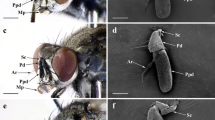Play all audios:

ABSTRACT Extraocular photoreception has been reported in several orders of insects, and direct photoreception by the central nervous system (CNS) has been shown to be related to the
circadian clock in many cases1. For example, CNS photoreceptors have been found in the brain and the last abdominal ganglion of the cockroach, _Periplaneta americana_, and in the brain of
the silkworm, _Hyalophora cecropia_2. In other cases dermal light sensitivity has been deduced from behavioural responses. For instance, the larvae of _Tenebrio molitor_ avoid light even
after decapitation3. The antennae of _Aphis fabae_ seem to be the site of light sensitivity responsible for the animal's photokinetic activity4. Dermal light sensitivity is demonstrable
in all the tergites of the larvae of _Acilius japonicus_ and _Dytiscus marginalis_, particularly well developed in the region of terminal abdominal spiracles5. We report here, however, the
electrophysiological response and morphological characteristics of presumptive photoreceptive sites on the genitalia of the Chinese yellow swallowtail butterfly, _Papilio xuthus_ L. Access
through your institution Buy or subscribe This is a preview of subscription content, access via your institution ACCESS OPTIONS Access through your institution Subscribe to this journal
Receive 51 print issues and online access $199.00 per year only $3.90 per issue Learn more Buy this article * Purchase on SpringerLink * Instant access to full article PDF Buy now Prices may
be subject to local taxes which are calculated during checkout ADDITIONAL ACCESS OPTIONS: * Log in * Learn about institutional subscriptions * Read our FAQs * Contact customer support
SIMILAR CONTENT BEING VIEWED BY OTHERS ANTENNAL AND PALPAL SENSILLA OF THREE PREDATORY _LISPE_ SPECIES (DIPTERA: MUSCIDAE): AN ULTRASTRUCTURAL INVESTIGATION Article Open access 15 September
2021 SEXUALLY DIMORPHIC PERIPHERAL SENSORY NEURONS REGULATE COPULATION DURATION AND PERSISTENCE IN MALE _DROSOPHILA_ Article Open access 13 April 2022 THE SPECTRAL SENSITIVITY OF
_DROSOPHILA_ PHOTORECEPTORS Article Open access 26 October 2020 REFERENCES * Bennett, M. F. in _Handbook of Sensory Physiology_ Vol. 7, 6A (ed. Autrum, H.) 641–664 (Springer, New York,
1979). Google Scholar * Saunders, D. S. _Insect Clocks_ (Pergamon, Oxford, 1976). Google Scholar * Tucolesco, J. _Bull. Biol._ no. 4, 1–35 (1933). * Booth, C. O. _Nature_ 197, 265–266
(1963). Article ADS Google Scholar * Schöne, H. _Z. vergl. Physiol._ 33, 63–98 (1951). Article Google Scholar * Barber, V. C. _et al._ _Z. Zellforsch._ 76, 295–359 (1967). Article
Google Scholar * Yamamoto, T. _et al._ _J. Cell Biol._ 25, 345–359 (1965). Article CAS Google Scholar Download references AUTHOR INFORMATION Author notes * Eisuke Eguchi: Department of
Biology, Yokohama City University, Kanazawa-ku, Yokohama, Japan AUTHORS AND AFFILIATIONS * Life Science Institute, Sophia University, Kioicho, Chiyoda-ku, Tokyo, 7-1, Japan Kentaro Arikawa,
Eisuke Eguchi, Akihiro Yoshida & Kiyoshi Aoki Authors * Kentaro Arikawa View author publications You can also search for this author inPubMed Google Scholar * Eisuke Eguchi View author
publications You can also search for this author inPubMed Google Scholar * Akihiro Yoshida View author publications You can also search for this author inPubMed Google Scholar * Kiyoshi Aoki
View author publications You can also search for this author inPubMed Google Scholar RIGHTS AND PERMISSIONS Reprints and permissions ABOUT THIS ARTICLE CITE THIS ARTICLE Arikawa, K.,
Eguchi, E., Yoshida, A. _et al._ Multiple extraocular photoreceptive areas on genitalia of butterfly _Papilio xuthus_. _Nature_ 288, 700–702 (1980). https://doi.org/10.1038/288700a0 Download
citation * Received: 07 August 1980 * Accepted: 30 October 1980 * Issue Date: 18 December 1980 * DOI: https://doi.org/10.1038/288700a0 SHARE THIS ARTICLE Anyone you share the following link
with will be able to read this content: Get shareable link Sorry, a shareable link is not currently available for this article. Copy to clipboard Provided by the Springer Nature SharedIt
content-sharing initiative
